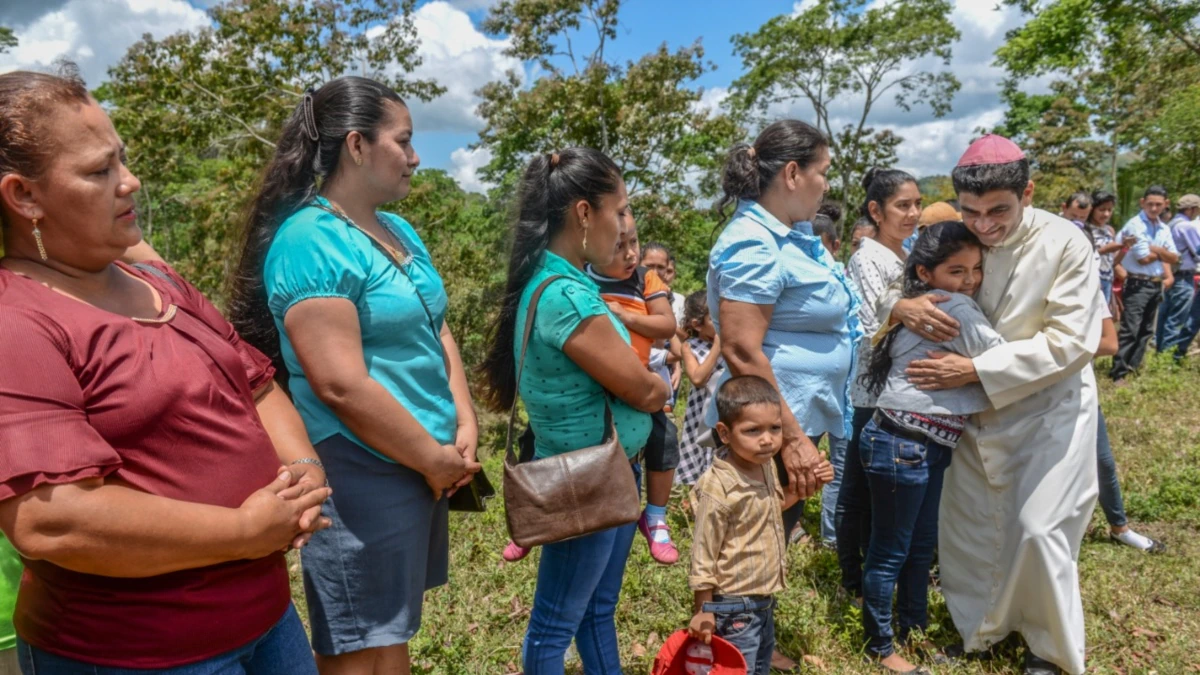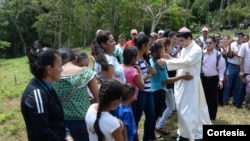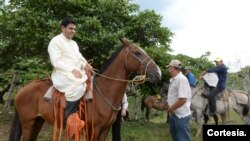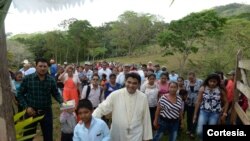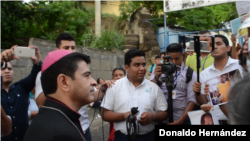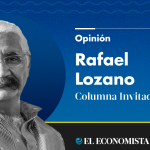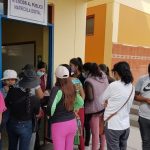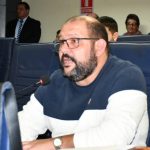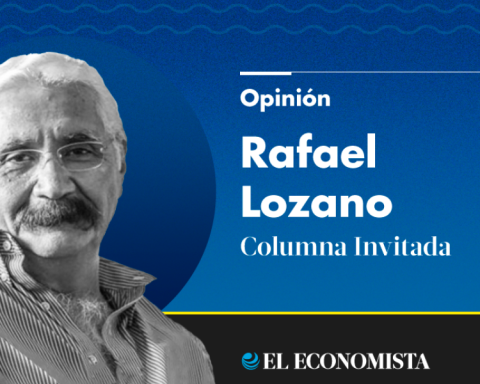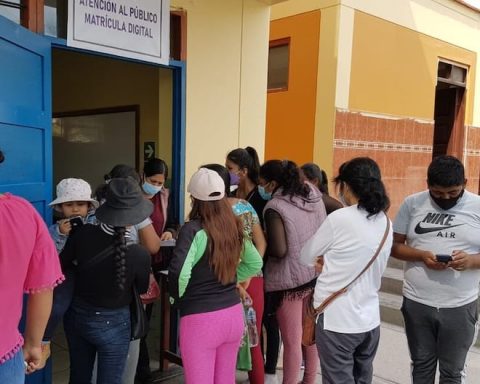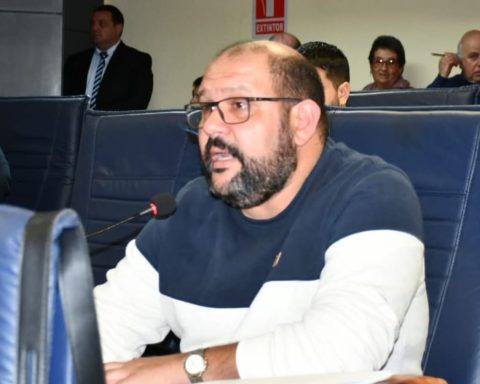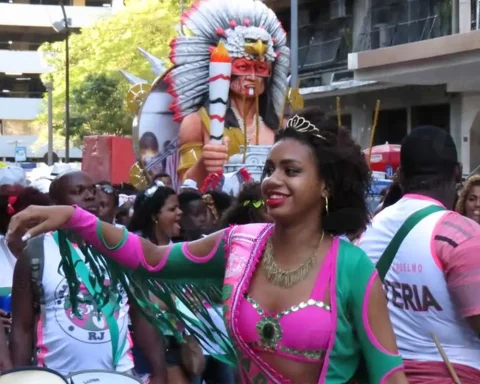In a matter of hours, the images of Nicaraguan Bishop Rolando Álvarez went around the world at the beginning of August, while he was holding the figure of the Blessed Sacrament while facing policemen who prevented him from leaving freely from the Episcopal Palace, in Matagalpa, a city to the north from Managua.
This incident once again highlighted the tension between the Catholic Church and the Sandinista administration of Daniel Ortega since 2018, with the government branding religious leaders as “coup plotters” for harboring protesters in temples, but also for asking for an end to the repression.
The act was broadcast on August 4 on the Facebook account of the Diocese of Matagalpa led by Álvarez, and apparently accelerated an accusation by the National Police against him: he was singled out for “organizing violent groups”, an investigation is underway and remains under house arrest.
So far, Álvarez is in Managua, under house arrest and accused of inciting violent groups.
Faced with this situation, the question arises: who is this bishop who has even made Pope Francis show his concern from the Vatican about what is happening in Nicaragua?
Exiled during the Sandinista revolution
Monsignor Rolando Álvarez is a 56-year-old religious, born in Managua in 1966.
He completed his philosophical studies at the Nuestra Señora de la Asunción National Major Seminary in Guatemala City, where he was exiled.
Since he was a child, according to what his older sister Vilma Álvarez told the magazine MagazineFrom the newspaper the press, “he liked the things of the Church”. He even remembered that he liked to play religious and officiate masses.
Years later he was ordained a priest and later bishop of the Diocese of Matagalpa.
When he turned 16, his family insisted that he should leave the country because he was already old enough to be recruited into the Compulsory Military Service, according to the laws of the then ruling Sandinista government, in the 1980s. Those recruited were then in charge of “defending the revolution” from the internal war that the country was waging in those years.
Although Álvarez refused to leave the country, after two or three arrests, he decided to go into exile in Guatemala, where he carried out his philosophical studies.
Later he studied at the Pontifical Lateran University in Rome, where he obtained a baccalaureate in Theology. Finally, at the Pontifical Gregorian University he graduated with a Licentiate in Philosophy, according to the website of the Episcopal Conference.
His sister Vilma Álvarez told Magazine that the prelate “never got involved in politics, only in religion.”
The priest Edwin Roman —who is currently in exile in the United States— met Álvarez when he was a refugee in Guatemala.
Roman tells the VOA that from a young age Álvarez had “capacity for leadership” and “was always accessible, committed to his church, simple, spontaneous and in a good mood.”
Then, Román said, he lost track of Álvarez until he saw him arrive in Nicaragua again when he was ordained a priest.
Pope Benedict XVI appointed Álvarez as bishop of Matagalpa on March 8, 2011.
From his Diocese, Álvarez was in charge of the Direction of Catholic Radio of Nicaragua. He also served as Secretary of Media of the Episcopal Conference of Nicaragua.
Álvarez vehemently denounced the closure of a group of radio stations belonging to the Catholic Church that he managed.
“All our radios have been closed. But the Word of God will not be silenced,” Álvarez said on his Twitter account, after the decision of the telecommunications regulator, Telcor.
a bishop on horseback
The journalist specializing in religious issues, Emiliano Chamorro, who covered issues related to the Catholic Church for more than ten years for the daily the press, remember very well the work of Álvarez.
For example, the day he covered a religious leader’s visit to a mountainous community in the north of the country comes to mind.
“When Monsignor Rolando arrived in the mountains, the peasants came down on horseback, in vehicles, in panga [pequeña embarcación], to greet him, listen to his sermons that were quite Christocentric and the word he gave was a word of encouragement, of hope. It is because of that evangelizing charisma that he was very well received by the peasants, ”Chamorro said by telephone to the Voice of America.
Álvarez brought the religious message to the communities, but also support and words of encouragement with a level of humility that generated empathy with the locals who came out to receive him, recalls the journalist currently exiled in the US.
Chamorro says that Álvarez had no problem riding a horse to visit the communities and evangelize. Proof of this is that by 2017 the religious had already visited a total of 490 rural communities, out of 530 that the Diocese that he administered has.
“Sometimes he walked in the middle of the mud, the rivers, he ate with the peasants and, as I tell you, his arrival was like they were celebrating the festivities of a patron saint. He was very loved. Always, the people, long before he arrived, were already organizing to receive him. He slept in the mountains sometimes.”
The demands of the peasants were denounced by the prelate in homilies and in the media. This was the case during the protests against President Ortega for the intention of his government to build a Grand Canal in Nicaragua, which was seen as a threat and dispossession of the land.
“I perceive the lack of trust from the various powers of the State from the northern peasant (…) In general there is a lamentation, on the one hand for many arbitrariness and on the other hand for many illegalities”, the bishop said to the journalist Emiliano Chamorro in 2017.
Álvarez also showed a firm stance during the crisis in 2018 that left more than 300 dead. In fact, he was part of the Nicaraguan Episcopal Conference team that served as a witness and mediator in the first National Dialogue between Ortega and the protesters.
“The national dialogue has only one goal: change. Change is inevitable, there is no other way, there is no other purpose. The change is coming and with it the democratization of the Republic of Nicaragua”, the bishop stressed.
That same year he went to the old prison in Managua, known as El Chipote, to ask about the peasants from the north detained during the protests.
The journalist Emiliano Chamorro assures that “the Ortega-Murillo dictatorship is going to exile Monsignor Rolando Álvarez because he is a pastor who makes them uncomfortable.”
His assertion comes at a time when most of the voices critical of the Sandinista government have been silenced with jail or exile, for which some fear that the end of the persecution against Álvarez has one of these objectives.
“[Sería] a very hard blow to the faith and morals of Catholics,” says Chamorro. affirming that a pastor who has been there at all times with the Nicaraguans would leave the country.
“Rosario Murillo and Daniel Ortega have made Nicaragua a country with practically no human rights. Not only the right to express oneself freely, to demonstrate, disappeared; Now in Nicaragua no one can engage in opposition politics because you are a terrorist, but the dictatorship has gone so far as to criminalize faith. It’s incredible,” laments Chamorro.
Connect with the Voice of America! Subscribe to our channel Youtube and turn on notifications, or follow us on social media: Facebook, Twitter and Instagram.
